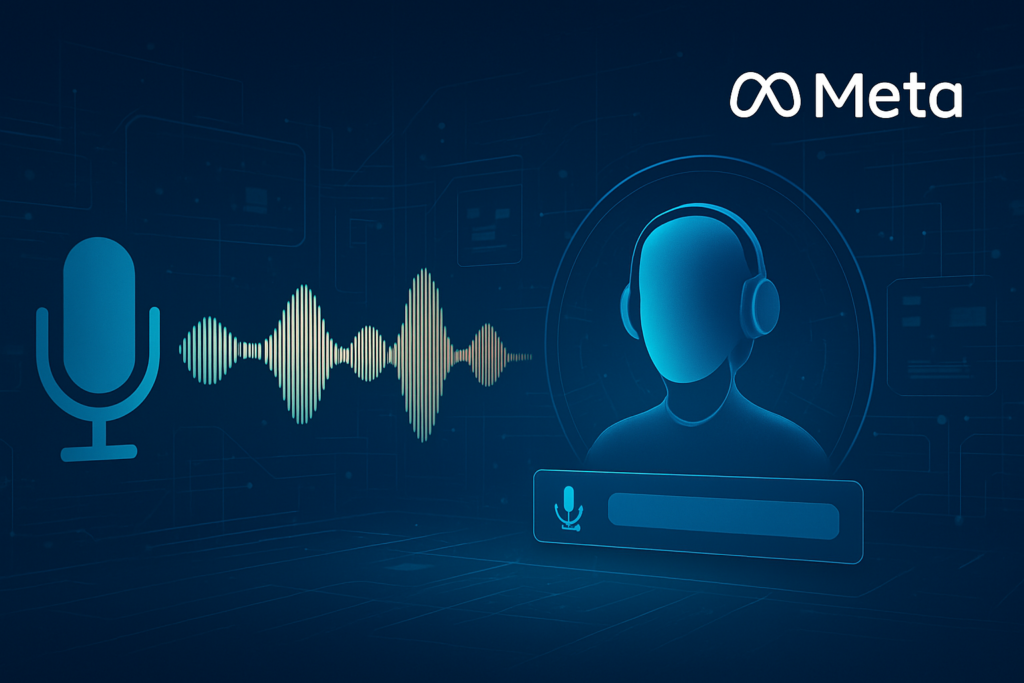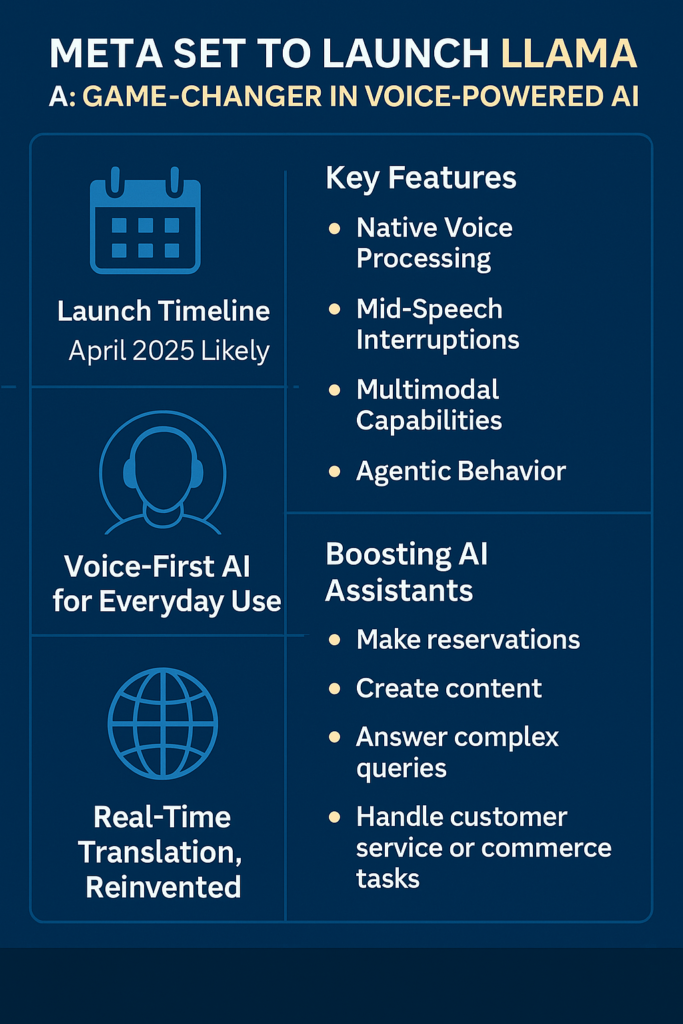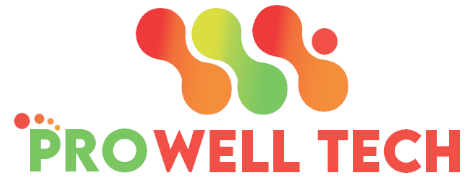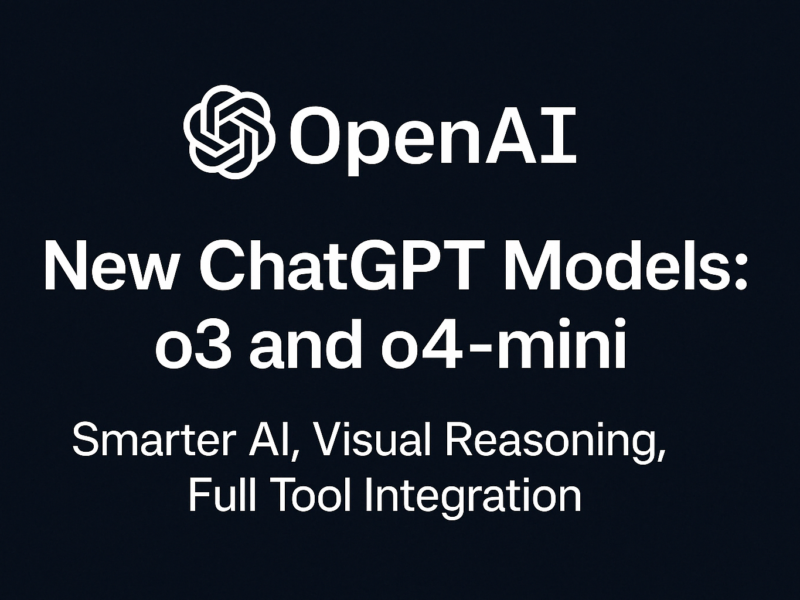By Thiruvenkatam | March 28, 2025 | Prowell Tech
Meta is preparing to launch LLaMA 4, its latest large language model, signalling a major leap forward in voice-powered artificial intelligence. With native speech interaction, agentic capabilities, and multimodal architecture, LLaMA 4 is expected to redefine how users interact with AI — from smart assistants to real-time translators.
Contents
Launch Timeline: April 2025 Likely
While Meta hasn’t officially confirmed a release date, multiple credible sources — including Financial Times, PYMNTS, and Barchart — point to a launch in April 2025, possibly timed with Meta’s first-ever LlamaCon AI Conference on April 29.
What’s New in LLaMA 4?
LLaMA 4 is shaping up to be a major upgrade, both technically and functionally. Key features include:
-
Native Voice Processing: Understands and responds to speech directly without converting it to text.
-
Mid-Speech Interruptions: Allows more natural back-and-forth conversations.
-
Multimodal Capabilities: Processes voice and text data simultaneously.
-
Agentic Behavior: Can perform multi-step tasks autonomously.
-
Open-Source Architecture: Enables wide adoption and developer customization.
Meta CEO Mark Zuckerberg calls LLaMA 4 “natively multimodal” and capable of “agentic reasoning,” aiming to move beyond simple chatbots and into the realm of powerful AI agents.

Voice-First AI for Everyday Use
The focus on voice marks a shift in Meta’s AI vision. LLaMA 4 aims to power AI assistants that feel more human — capable of real dialogue, interruptions, and emotional tone detection.
These features are particularly important for wearable tech, such as the Ray-Ban Meta smart glasses, where voice is the primary interface. With LLaMA 4, Meta AI can become a hands-free, always-available assistant across apps and devices.
Boosting AI Assistants with Agentic Capabilities
LLaMA 4’s “omni model” architecture will give AI assistants a broader understanding of user intent, enabling them to:
-
Make reservations
-
Create content
-
Answer complex queries
-
Handle customer service or commerce tasks
Meta is already testing business-focused AI agents and has launched the Llama Stack, a developer framework for building AI workflows with LLaMA.
Real-Time Translation, Reinvented
According to Meta’s CPO Chris Cox, LLaMA 4 will support direct speech-to-speech translation, enhancing speed and fluidity. While full language support hasn’t been disclosed, Meta’s SeamlessM4T and SeamlessStreaming projects suggest expanded capabilities in multilingual AI.
How It Stacks Up to Competitors
| Feature | LLaMA 3 | LLaMA 4 | GPT-4 | Gemini |
|---|---|---|---|---|
| Voice Capabilities | Basic | Native Speech, Interruptible | Advanced | Advanced |
| Multimodal | Limited | Yes (Voice + Text) | Text, Image, Audio | Yes |
| Agentic Tasks | Limited | Yes | Limited | Yes (Likely) |
| Open Source | Yes | Yes | No | No |
Compared to GPT-4 and Google Gemini, LLaMA 4 stands out for its open-source flexibility and voice-first design. Previous LLaMA models have already outperformed GPT-4 in select benchmarks, including reasoning and code generation.
Big Bets, Big Infrastructure
Meta plans to invest $65 billion in AI in 2025, including building a 2-gigawatt data center and leveraging NVIDIA’s Blackwell GPUs. Zuckerberg says training LLaMA 4 required 10x more compute than LLaMA 3.
What’s Next?
Meta has hinted at multiple LLaMA 4 variants releasing throughout 2025, each designed for different applications — from consumer assistants to enterprise automation.
Future integrations may include:
-
Premium Meta AI subscriptions
-
Content creation tools (like Meta’s Movie Gen)
-
Wearables with always-on voice assistants
-
Customer-facing business agents in WhatsApp and Messenger

Final Thoughts
LLaMA 4 isn’t just an upgrade — it’s a shift in how we experience AI. Meta is betting that voice is the future of digital interaction, and with agentic intelligence, the company aims to push AI from a reactive tool to an active assistant.
LLaMA 4 has the potential to provide developers, businesses, and consumers with a more intuitive, natural, and powerful AI experience, supported by Meta’s expanding open-source ecosystem.
✅ Follow Prowell Tech for more updates on generative AI, language models, and emerging tech.


